Since their introduction to America, domestic geese went through selective breeding to develop specialized breeds of geese, particularly for increased size, modified behavior, and quality egg and meat production. One interesting breed is the African goose, whose origins are unknown.
African geese are a specific breed of domestic ducks that are believed to have descended from the Asiatic swan goose. Large and heavy-bodied waterfowl, the African geese are used for meat production due to their high-quality lean meat.
They are known to be aggressive. But they can easily become docile when handled daily, making them good pets.
To know more about African geese, their history, physical attributes, distinctive characteristics, egg-laying abilities, and other interesting information, simply read further this article!
African Goose History
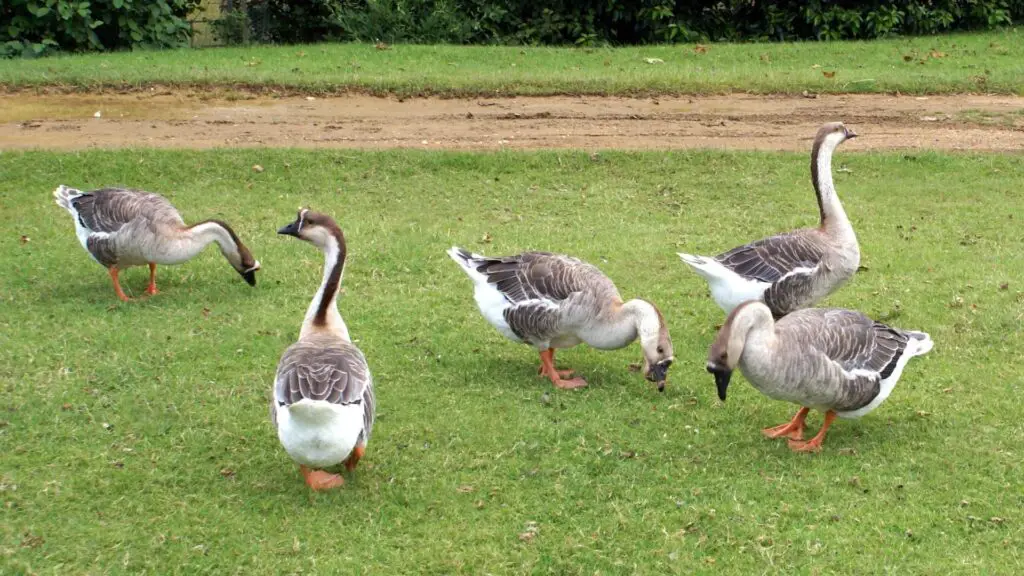
It is currently unknown where the African goose originated as it is believed to be brought to America on ships that made various stops around the world. However, it is believed that it has close relations to the Chinese goose and that both species have descended from the wild swan goose (Anser cygnoides) found in Asia.
Theories surrounding the origins of the goose are that it is either a hybrid between the swan and Chinese geese or it is a direct subspecies of the swan goose. Whatever the case, it is believed that their unique characteristics were a result of selective breeding.
African geese were introduced in Europe during their arrival in the late 1700s, and in North America in the mid-1800s. Since then, it was identified as a specific goose breed, but it wasn’t until 1874 and 1987 that the brown African goose and white African goose, respectively, were formally accepted into the American Poultry Association’s Standard of Perfection.
African Goose Identification
What Do African Geese Look Like?
The African goose is a large, heavy-bodied waterfowl with a confident posture, smooth and rounded abdomen, large and deep-set eyes, thick neck, stout beak, a smooth dewlap that hangs from its lower jaw down to its upper neck, and an upward pointing tail. Adults have a knob or a prominent, swollen bump on their forehead.
There are two varieties of the African goose:
- The brown African goose is a combination of gray, brown, buff, and white coloration, with a dark brown stripe across its crown and running down the back of its neck, as well as a thin band of white feathers between its knob and beak. It also has orange legs and feet.
- The white African goose has an overall white plumage and an orange knob, beak, shanks, and feet.
How Long Does an African Goose Live?
African geese can live about 10 to 15 years in captivity, making it one of the longest-living breeds of goose, along with the Chinese goose, which has the same lifespan, and the Embden goose, which has a lifespan of 16 to 25 years.
How Big Do African Geese Grow?
The exact size of African geese is currently unknown. However, they are believed to be approximately the same size as embden geese, which are about 1 meter in height when fully standing.
Are African Geese a Heavy Breed?
African geese are a heavy breed. In fact, they are the largest among goose breeds, but they are not as heavy as the white embden and toulouse geese.
Young ganders or male geese weigh around 7.3 to 8.2 kilograms, while matura ganders reach a weight of 10 kilograms. On the other hand, mature female geese weigh about 8.2 kilograms.
African Goose Wingspan
African geese’s wingspan can reach up to 2.1 meters in length.
What Is African Goose Known For?
Due to their large size, the African geese can produce high-quality lean meat, which makes it an ideal choice for roasting. African geese are often crossbred with Toulouse geese, another domestic goose breed, to develop a good quality commercial hybrid for meat.
However, to achieve great commercial African geese, they must be keelless and have moderately full abdomens. Birds that have slender necks, narrow heads, drooping tails, shallow bodies, and prominent keels are usually an indication of poor-quality meat.
Where Do African Geese Originate?
It is unknown where African geese came from since it is believed that it was introduced in America on ships that made numerous stops across the world.
However, since it is believed to have descended from the Asiatic swan goose, it may have likely come from Asia but this has yet to be proven with concrete genetic and morphological evidence.
What Are the Distinct Characteristics of an African Goose?
African geese are non-migratory as they aren’t able to fly. They are diurnal, territorial, and highly social waterfowl as they prefer living in large groups called gaggles. They inhabit grassy areas mainly with access to a water source.
How to Tell Male From Female African Geese?
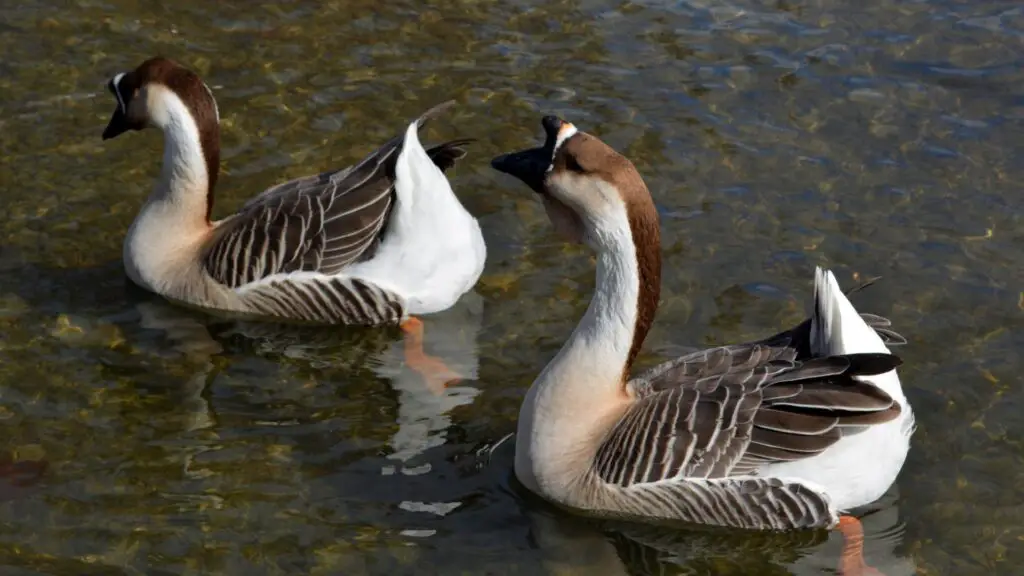
Ganders are usually larger and have a more prominent knob and dewlap compared to female geese. Males also have a small, fleshy projection found in their cloaca that serves as their reproductive organ, while females lack this physical feature.
Are African Geese Good Pets?
African geese are good pets. If they are handled daily, they can be docile creatures. They are low-maintenance pets—just provide them with adequate space and a swimming area.
Moreover, they are intelligent and territorial, which means they can help alert their owners when there are intruders. Despite that, they won’t attack any visitors unless they have a nest or chicks to protect.
The downsides are that they are initially aggressive before being tamed and that they are loud birds as they constantly vocalize, making them a nuisance in residential areas.
What Do African Geese Eat?
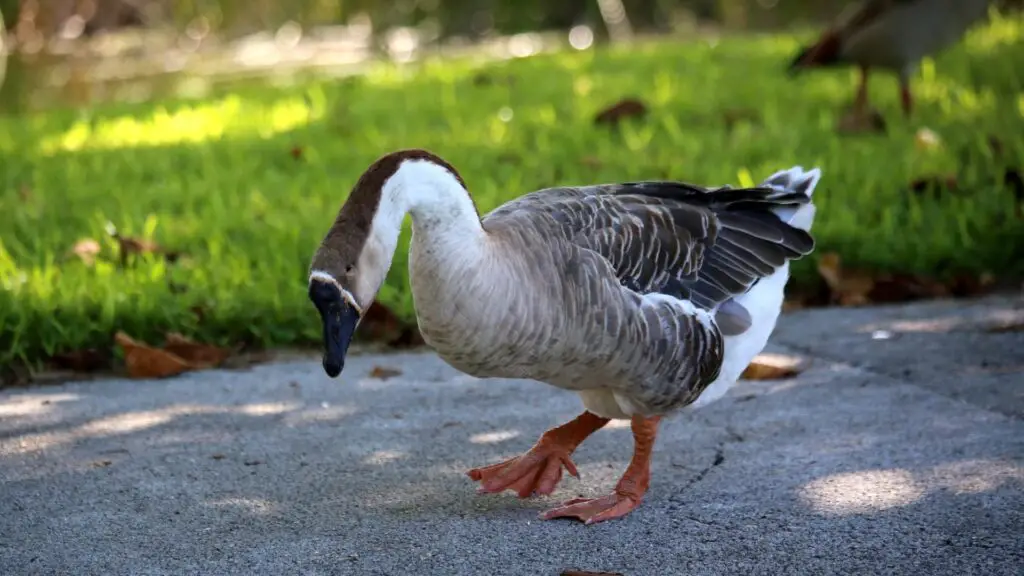
African geese are herbivorous animals, which means they eat plant material, usually grass, seeds, and aquatic plants. Also, they consume snails, small fish, insect larvae and pupae, and small grains such as rye, barley, and wheat. They can also be fed with commercially available waterfowl diets and bird feeds.
When Do African Geese Lay Eggs?
If they are managed well, African geese can reproduce in their first year, usually during the fall season. But most will wait until late winter or early spring, specifically in February, to lay eggs and then incubate them at the start of spring for 30 to 32 days until they hatch.
How Often Do African Geese Lay Eggs?
Once a year, during the spring season. They are only able to reproduce a single clutch annually, composed of 20 to 40 extra-large eggs weighing about 5 to 8 ounces.
What Color Are African Goose Eggs?
African goose eggs are white in color and thick-shelled.
Are African Goose Eggs Good to Eat?
African goose eggs are good to eat. However, it may have a stronger flavor compared to chicken and duck eggs. Thus, they aren’t the best choice for consumption. It all depends on the preferences of the consumer.
Do African Geese Go Broody?
African geese go broody, specifically after laying their clutch for the year. They go broody, and then they sit on their eggs.
Usually, owners will put broody geese together in coops so that the owners can regularly check up on them. There are also incidences of egg breakages, which owners will provide before egg laying season nest boxes to reduce their occurrence.
Do African Geese Fly?
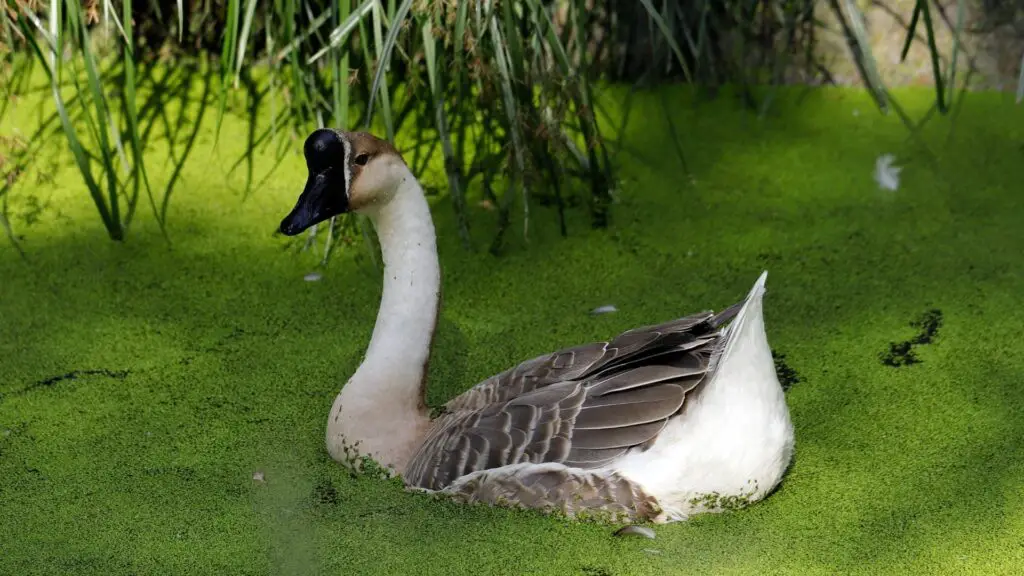
Compared to other geese, they are unable to fly. This is because they are domestically grown on farms. Also, they have large and heavy bodies, which greatly reduces their flight capability and maneuverability.
Do African Geese Migrate?
African geese don’t migrate since they do not fly. African geese are a sedentary breed.
Are African Geese Loud?
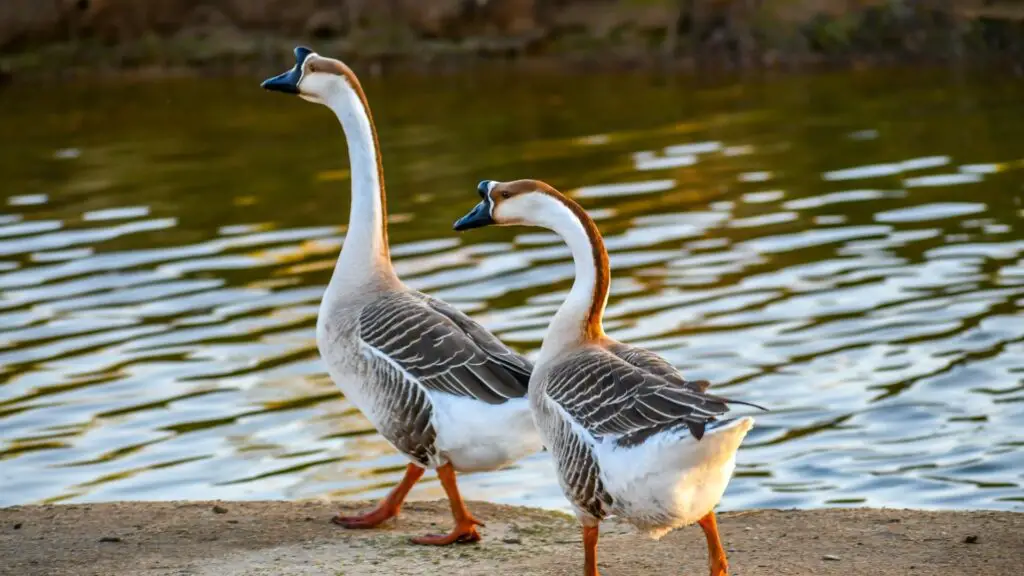
African geese are extremely loud and are known to vocalize constantly. Compared to other geese, they create a sound that sounds like a “doin,” instead of the usual “honk.”
How to Raise African Geese?
- If raised for commercial meat production, consider confinement housing to increase twice the amount of geese you can have in an acre or in houses that are raised on slats or wire mesh.
- For raising geese as pets, their houses should have grass floors and protection against predators. At least one square meter per goose is required for indoor housing and two square meters each for outdoor housing.
- If you can, provide the geese with enough shelter for shade during hot weather. Also, provide a swimming area for your geese, as well as easy access to water. A pool or a pond is ideal, and it must be cleaned and maintained daily to prevent the risk of your geese acquiring infections and diseases.
- Make sure the geese have at least one or two companions with them inside their pens as they thrive on social interactions with other geese.
- You can feed African geese with grass, herbaceous plants, and grains, but you can also purchase commercially available goose diets. These diets come in different variants based on the age of the geese so feed accordingly.
List of Sources
Egg Production, Incubation and Sex Identification of Geese
